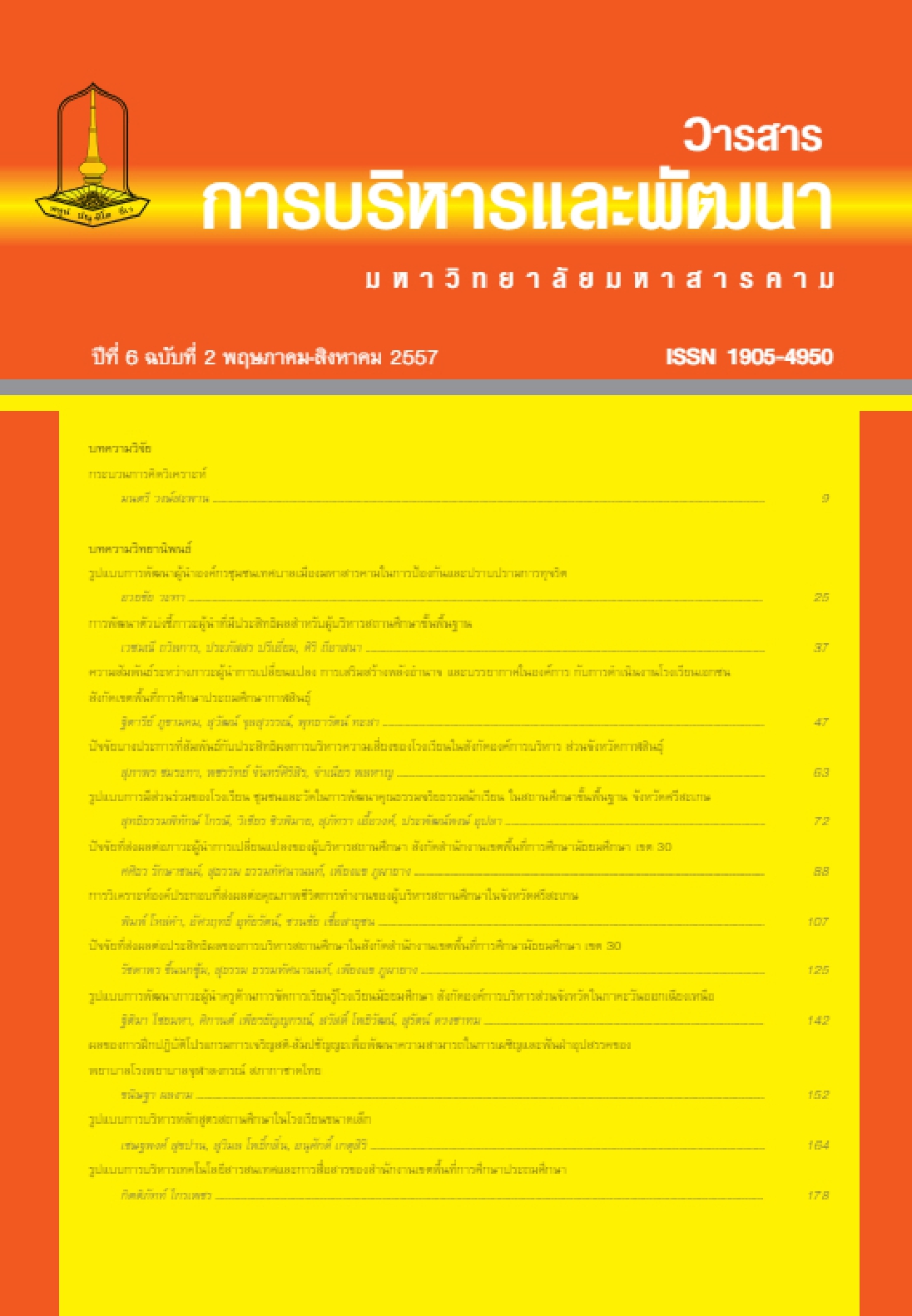A model for Developing the Leaders of community Organizations in Muang District to Anti-Corruption
Main Article Content
Abstract
The objectives of this research were to design a model for developing the leaders of community organization to Anti-Corruption by means of training knowledge group construction, to evaluate the implementation of the knowledge group and to make a comparative study of knowledge, attitudes and behaviors on anti-corruption. The samples consisted of forty-four leaders of community organizations, who were selected by the simple random sampling technique. The research instruments were questionnaires for evaluating knowledge on anti-corruption, attitudes on anti-corruption and behaviors on anti-corruption. Two evaluation forms were used to assess the congruence and appropriateness of the training knowledge group. The statistics used for analyzing the collected data were percentage, mean, standard deviation and paired t-test was employed for testing hypotheses.
The finding of the study revealed that the most effective strategy for anti-corruption was knowledge group construction to develop the leaders of community organizations. The knowledge group consisted of four stages: 1) studying and analyzing problem, theories and review research documents and assessing needs; 2) establishing and developing the knowledge group ; 3) implementing the knowledge group 4) evaluating and improving the knowledge group. This strategy provided an opportunity for developing the leaders of community organization to anti-corruption through the training process. The contents of training knowledge group consisted of four units, namely, 1) Knowledge and Skills on Leadership, 2) Knowledge and Skills Art of Speech for Communication, 3) Knowledge and Skills on Development Teamwork and Network, 4) Knowledge and Skills on Anti-Corruption. The research results showed that the leaders of community organizations had higher scores on anti-corruption, the level of knowledge, attitudes and behaviors on anti-corruption after training as a whole than before training (p-value < 0.05).
Downloads
Article Details
References
Kulya Tanplachiva. The psycho-intellectual Teaching model: Suggestions for activity on prosocial of young children. Bankok: Ficaulty of Education Srinakarintarawirot University, 2000.
khemrudee wanikanukul. Thai bureaucracy: A case Study of Procurement and Prochasing Processes. Master of Economic. National Institute of Development Adminitration, 2003.
Chanchai Ajinsmajan. Skill for Adminitration Team. Bankok: Expernet, 2000.
Natthapan Khechornnant . Building for Effective Team. Bankok: Expernet, 2011.
Phasuk Pongpichitr. Corruption in Thai bureaucracy. Bankok: The National CounterCorruption Commission, 2001.
The National Counter-Corruption Commission. “Strategy for Anti Corruption”, Bankok, 2010.
“Handbook and Trend for support People Network to Anti Corruption” . Bankok, 2000.
Worwuti Chirasucharittum . A course to developing curriculum for develop youth leadership skill in vocational training Catholic Schools. Ph.D., Desertation, (Education Adminitration). Bankok: Srinakarintarawirot University, 2010.
Wibul Bunyatarokul. Handbook for Expert and Manager training. Bankok: Dansutu, 2002.
Srisuda Mana. Environment procedure study for grasping garbage at Pluplanarai Distric Muang Chantaburi. Bankok: Master of Science. Khasetsatr University, 2004.
Sangad Utranant. Basic and principle for develop Curriculum. Bankok: Mitrsaim, 1989.
Sman Managit. Annual report 2010 for The official of Mahasarakham Natural resource and Environment. Mahasarakham: Apicat printing, 2010.
Satean Panleu. A Developing curriculum to support leadership for student leaders in Sonklanakarintr University. Bankok: Master of Art Srinakarintarawirot University, 2007.
Somchat Gijyunyong. Developing for team sercice. Bankok: Expernet, 2001.
Rattikorn chongwisan. Training for changing a leadership of student in Kasetsatra University. Ph.D., Desertation, Bankok: Srinakarintarawirot University, 2000.
Cohen, H.G. “Two Teaching Strategies: Their Effectiveness with Students of Varying Cognitive Abilities, School Science And Mathematics. 92 (3): 26-133, 1992
Cornell, Joanna A., Creating Environmental Stewardship: Evidence from a Community-Base Adult Education Program. Ph.D., Dissertation, George Mason University, 2007. AAT 3255984, ProQuest, 30/01/2551.
Katherine Kulakowski. Environmental responsibilities law, Sydney: Law Book Co., 2005.
Rothwell, William J. Beyond Training and Development: State of Art-Strategies for Human Performance. New York: American Management Association, 1996.
Silberman, Mel. Active Training: A Hand Booh of Thechniques, designs, Case Example, and Tips. 2nd ed. California: Jossey-Base Pfeiffer, 1998.
UNCED. United Nations Conference on Environment and Development, 3-14 June 1992
Vella, Jane. Training Though Dialougue. Sanfrncisco: Jossey-Base, 1995.
Volk, Trudi L and Cheak, Marie J. (2003) Online Available: http://highbeam. com/journalof
Environment education/June 22, 2003/t. Retrieve December 28, 2004.


